#bi notes for a bisexual revolution
Text
"However, more central to this one is the presumption I mentioned in the first part, that bisexual women are actually straight, while bisexual men are actually gay. The idea presented here is that of the immaculate phallus, suggesting that phallic adoration is the one true thing uniting all bisexual people. It projects society’s own phallocentrism onto the idea of bisexuality. This permits us to critically reflect this phallocentrism back into society, exposing the underlying system of sexism and misogyny as we do so. It might also help us explore alternative ways of relating to the penis itself, as well as to masculinity, subverting sexist connotations of the penis as an all-powerful, all-forceful, all-domineering, hypersexualized, and hypermasculinized phallus. Instead, we can reconstruct the male body and masculinity and create new visions of subversive and feminist masculinities."
Shiri Eisner, Bi : Notes for a Bisexual Revolution (2013)
14 notes
·
View notes
Text
Bisexual Books
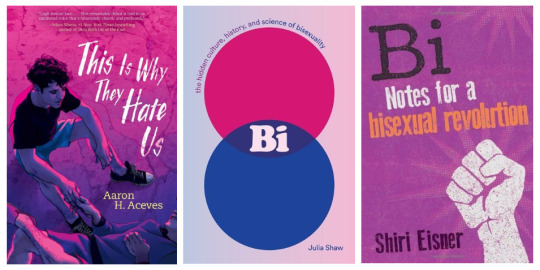
Bi: The Hidden Culture, History and Science of Bisexuality by Julia Shaw
Red, White and Royal Blue by Casey McQuiston
Perfect On Paper by Sophie Gonzales
Imogen, Obviously by Becky Albertalli
Greedy: Notes From A Bisexual Who Wants Too Much by Jen Winston
The Seven Husbands Of Evelyn Hugo by Taylor Jenkins Reid
Bi: Notes For A Bisexual Revolution by Shiri Eisner
Verona Comics by Jennifer Dugan
Hani and Ishu's Guide To Fake Dating by Adiba Jaigirdar
Bisexual Men Exist by Vaneet Mehta
Hugged by Verity Ritchie
This Is Why They Hate Us by Aaron H. Aceves
Heartstopper Vol. 1 by Alice Oseman
One Last Stop by Casey McQuiston
Bi Any Other Name: Bisexual People Speak Out by Various Authors
#books#book blog#booklr#readblr#book reccs#book recommendations#bookblr#bookworm#bookaddict#books and reading#bisexual#lgbt#wlw#mlm#bisexual erasure#bisexual awareness#bisexuality#bisexual mcs#bi actually#lgbtq books#bisexual books#bisexual visibility
160 notes
·
View notes
Note
So...Thoughts on the whole people thinking Sylvie is Aro-Ace? I can kinda see her being Aromantic, but with her mentioning she's more "hedonistic" than Loki and silently hinting that she's Bi too, can't really see her as Asexual. But what do you think?
LET'S TALK ABOUT SYLVIE'S SEXUALITY, HER RELATIONSHIPS WITH LOKI AND MOBIUS, & HER CONTRIBUTIONS TO THE SERIES NARRATIVE
Before I answer this, I think it's important to acknowledge that fictional characters exist for people's comfort and pleasure. I write original fiction, and I would hope that most artists believe in the right of the audience to interpret character to meet their personal needs. To me, canon is a sandbox. Everyone should play with it as they please and not hate on each other. There are more important things in life to worry about. Therefore, if Sylvie reads as Aro-Ace to you and that reading brings you joy, then she is.
This question inherently requires the need to talk about Sylki in this post. I predominantly analyze Lokius, so please, no hate! My number one rule is never yucking someone's yum. Furthermore, Sylvie plays a critical role in Loki's development and the philosophical thrust of the series, of which Mobius also contributes to as the other half of Loki's character arc equation (selflessness and sparing life [Mobius] + free will and revolution [Sylvie]). It would be biased and disingenuous to not acknowledge her contributions to the overarching narrative.
ARO-ACE INTERPRETATION
All right, your question! I can definitely can see Sylvie as being aro-ace. That's a legitimate interpretation based on how she responds to Loki's flirtation and romantic advances. It is also possible that she's an aromantic bisexual. This second possibility is more likely based on the text the audience is given.
THE CANON TEXT
Having said that, I think you're curious about what the source material is trying to say about Sylvie's character and how that influences her sexuality. I believe it's important to remember that external behavior doesn't dictate how someone defines themselves. Closeting and disengagement from intimacy because of trauma are prime examples of this.
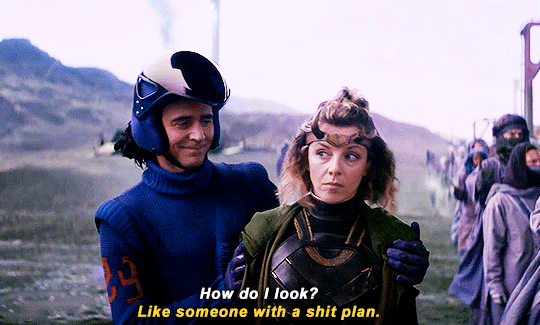
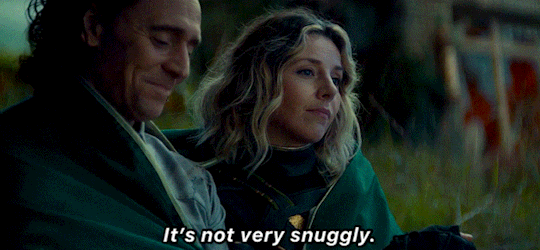
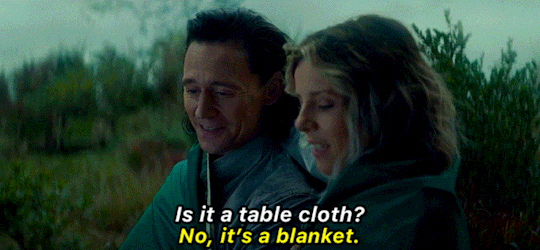
The train scene in S1E4 reads as earnest. Loki and Sylvie are both very lonely characters. In this moment, both are trying to connect with someone who finally understands them because they are the same. It's actually a lovely nod to the queer experience.
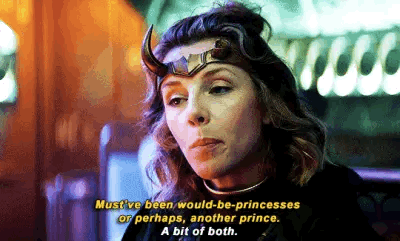
The dialogue, lighting, and costuming (blue, purple, pink) in this scene communicates they are both queer, specifically bisexual. The lighting and costuming combining to represent the bisexual pride flag is an example of queer subtext in film. The dialogue, while direct, is also written in such a way that it avoids explicitly stating "men and women." Sylvie later comments that the brief flings she indulges in during apocalypses helped her "keep going". She even specifies that apocalypses make people desperate. This suggests that Sylvie likely didn't need to do much wooing or charming like Loki would to obtain a sexual partner. Finally, the way Tom and Sophie play this scene is vulnerable. I therefore believe we can take this on-screen admission at face value.
So the question becomes, why does Sylvie respond to Loki's flirtations the way she does?
SYLVIE'S BACKGROUND
Sylvie was orphaned and forced to run all her life from a very young age. Her backstory is deeply tragic. To live in such a way means that she never had the opportunity to experience adolescence.

NOTE: This is honestly my favorite gif of Sylvie. She's so sweet and cute when she's happy. I can't get over the 5 stars on her employee badge. "Sylvie, can you refill the straws?" "Already did it!" The sweetheart.
Sylvie working at McDonald's accomplishes two things: it allows Disney to fulfill their advertising sponsorship agreement for the fast-food franchise, and it subtly alludes to Sylvie's need to live the adolescence she didn't get to. The TVA forced her into arrested development. She never had the chance to make friends and safely socialize on her own terms. The centuries of trauma have made trust, let alone romance, completely foreign to her.
Which is why, when Loki and Sylvie have romantic scenes, she is often awkward or, if not unreceptive, wary. Her previous flings, as she agrees with Loki, were "never real". Physical intimacy without emotional intimacy is a familiar dynamic for both characters. Their relationship with one another is their first experience of emotional intimacy (or at least attempt at it) outside of their families. The pursuit of this emotional intimacy feels safe to them because they are the same entity and thus they know each other's base nature (versus nurture!) to some degree.
The difference between them is that Sylvie has not experienced social rejection in the way Loki has (nurture!). She recognizes the wrongness with which the TVA has treated her. She knows the absolute atrocities the TVA has committed. She is determined to destroy them to free herself and all timelines. Sylvie is consequently more self-assured, more confident in what she wants and believes in, than Loki. In S2, Sylvie's clarity on desire is what allows her to help Loki articulate what he wants: his friends back, most especially Mobius.
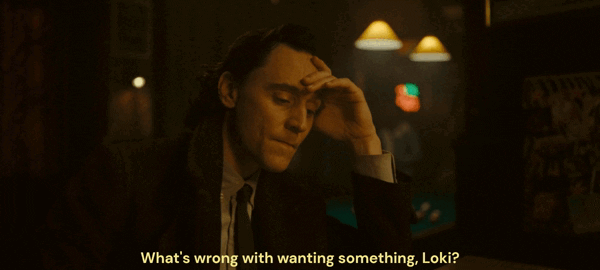
In S1E1, Loki, still posturing before Mobius, describes himself as a "liberator". At this point in the story, we know that isn't true, but it will become true by the finale. This line of dialogue foreshadows Loki's trajectory as well as Sylvie's revealed motivation in S1E4: to liberate.
THE NEXUS EVENT
There are a variety of ways for viewers to interpret what exactly the Nexus Event was. The canon, within the text of Mobius's dialogue and verbal confirmation from the creators, is that Loki and Sylvie fell in love. Now, I'm not going to spend time arguing over other interpretations here, but I will say that regardless of whatever pairing or OT3 a viewer ships, the Nexus Event was ALSO definitively this: two Lokis in the same place, at the same time, not feeling lonely together.
And Sylvie, who had confessed to Loki she has no friends and has never really experienced joy, answers Renslayer with the number of positive memories she has:
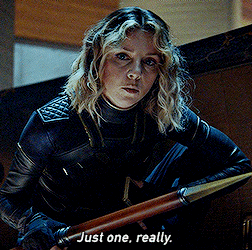
Sylvie doesn't state it outright, but the subtext is clear that her one positive memory was her time with Loki on Lamentis. Indeed, moments later, Sylvie prunes herself in an effort to find and rescue him.
SYLVIE & MOBIUS
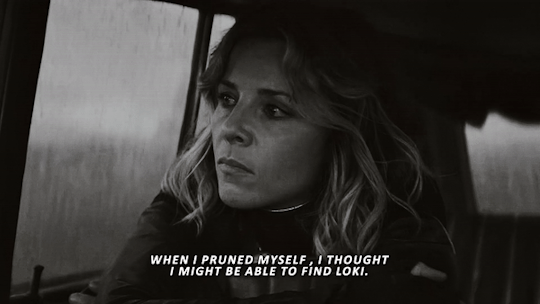
But being the harshly pragmatic individual she is, upon arrival and encountering Alioth, Sylvie assumes Loki didn't make it. I don't think Sylvie means what she says in a cruel way. I think she believes this because she is accustomed to disappointment and accordingly guards herself with cynicism. Sylvie's traumas, her difficulty with trust, her inexperience with intimate relationships, and her cynicism all combine to create an individual who may appear aro-ace when that may not necessarily be the case. Please note, however, that Sylvie being aro-ace or aro-bisexual may still be a possibility. My analysis here is based on what the text and subtext seem to be telling us about her character.
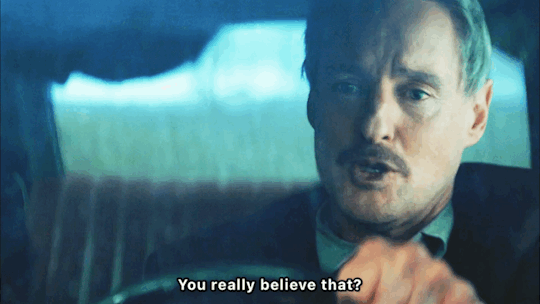
Notably, it is Mobius who is more optimistic about Loki's survival, wondering if Sylvie truly believes that Loki is dead.
This moment is brief, but it is significant because Mobius's optimism implies that not only does he believe in Loki, he also wants Loki to be alive. Sylvie is intelligent. She can read between the lines. We can also assume an off-screen conversation took place between them that confirmed for Sylvie Mobius's genuine care for Loki. When Sylvie informs Loki of this fact, I believe we get this:
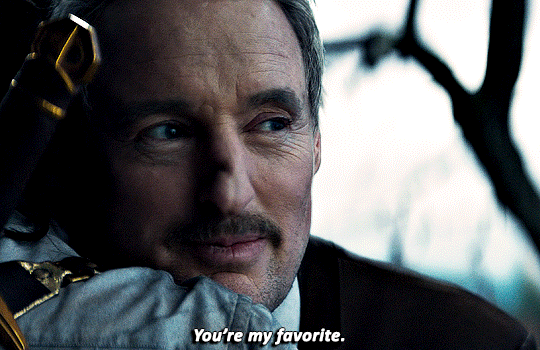
Mobius was conservative in how Loki might interpret their relationship, extending a handshake before their goodbyes. Loki, on the heels of his conversation with Sylvie, chooses to hug him instead. The result: Mobius is delighted!
I've long pondered on why Mobius would say, "You're my favorite" to Sylvie. I believe this is why: she helped along their friendship and opened the gates for physical affection between them. This demonstrates that Sylvie cares enough for Loki to ensure he is secure in his bond with Mobius. It likely helped that Mobius did not deny the TVA's evil when she pointed it out to him, and that he did not hesitate to apologize to her for it.
Ironically, it is Mobius's optimism, especially in the potential of broken things to become something better (whether it is Loki himself or the TVA), that creates the fraught philosophical divide between Sylvie and Mobius (and Loki) with regards to the TVA in S2.
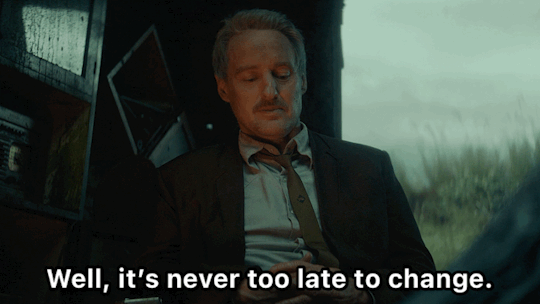
THE S1 FINALE
The S2 finale is where the narrative between Loki and Sylvie turns, and the plot pivots to the deepening relationship between Loki and Mobius. Triggering this event is Loki's desire to slow down and think about the consequences of killing HWR in the Citadel at The End of Time.
This may seem out-of-character at first glance. S1E1-E4 have demonstrated that Loki's decision making is sometimes chaotic by virtue of impulse. What was the last impulsive decision he made with heavy consequences?
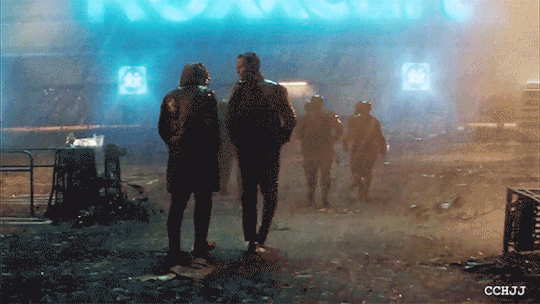

He ran off after Sylvie. A good decision ultimately, as Loki learns the truth about the TVA through Sylvie, but only by luck. This decision very nearly cost Loki a friendship, one he didn't even realize he had until Mobius called him a "bad friend."
Despite the fallout, Mobius recovers relatively quickly once he confirms Loki's claims and views Ravonna's recording of C-20. He reestablishes trust with Loki as soon as possible to help Loki be with the one he loves. Why? Because Mobius is ultimately selfless and wants Loki's happiness regardless of his own feelings of jealousy.
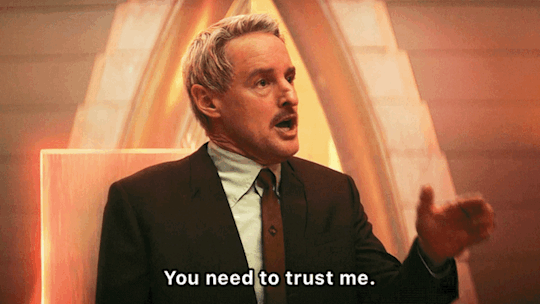
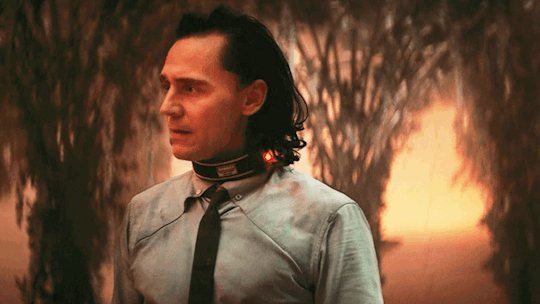
Which circles us back to the theme of trust and Sylvie's challenges with it.
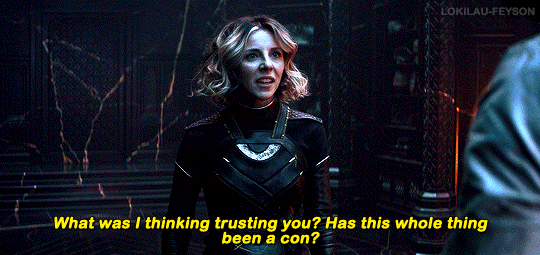
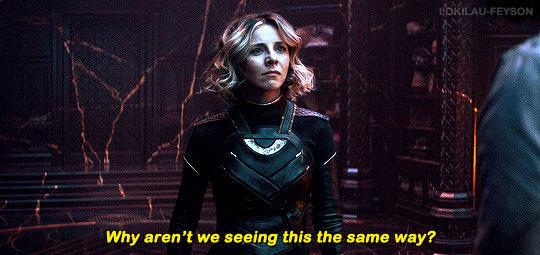
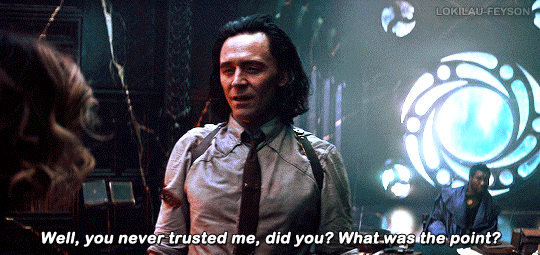
Loki and Sylvie's relationship falls apart not because of lack of mutual interest, but because Sylvie loses trust in Loki and with good reason: HWR (and thus the TVA) is the cause of all her suffering.
It is not Sylvie's fault she is this way. She hasn't had enough time to develop meaningful relationships, and the one relationship that was meaningful to her (Loki's) became, in her eyes, a profound betrayal. This experience only adds to the other traumas Sylvie carries with her, making encounters with Loki in S2 emotionally difficult if not triggering.
The relationships of Loki & Sylvie and Loki & Mobius are intentionally set side-by-side for 3 critical reasons:
1.) To demonstrate Loki's growth by developing trust and thus emotional intimacy with others.
2.) To create the Plot B emotional source of conflict in S2.
3.) To set-up Mobius and Sylvie's individual beliefs and values (selflessness and sparing life [Mobius] + free will and revolution [Sylvie]), which Loki combines into his own system of beliefs and values. This combination gives Loki the strength and wisdom to ascend the throne and become the God of Stories (and Time).
THE S2 FINALE
Loki comes to his final decision after speaking with the two halves of his character arc equation. Loki first seeks out Mobius, who shares with him the distinction between himself and Ravonna. Now, this is brainwashed Mobius. Brainwashed Mobius believed Ravonna could do the impossible while he couldn't. But Loki knows Ravonna's corruption.
Beneath Mobius's wisdom that "most purpose is more burden than glory" is also Mobius's heart: he could not prune children and that instinct was the right decision. His "failure" was not a failure of duty but rather his humanity succeeding despite the brainwashing. It's this same intrinsic compassion that drove Mobius to convince Ravonna to spare Loki. Loki articulates this to Don as such. He therefore takes the message of selflessness and sparing life from Mobius to Sylvie.
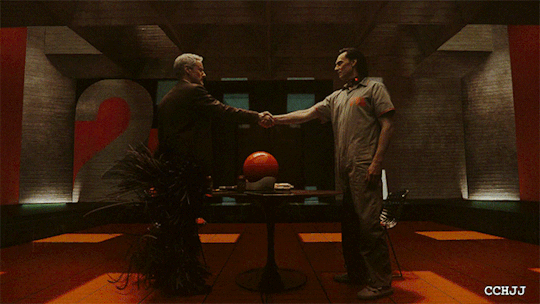
Sylvie, in turn, challenges Loki, stating they should have the freedom and right to fight whatever comes on their own terms.
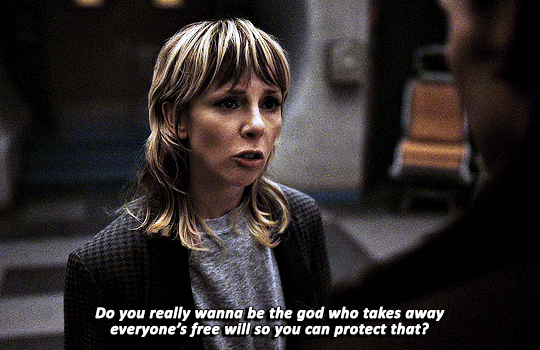
She also stresses that it is all right to destroy things. Upon hearing this, Loki comes to the conclusion that what is destroyed must be replaced with something better. What needs to be destroyed? Not the TVA and the people in it (not Mobius, Verity, OB, and Casey), but the Loom.
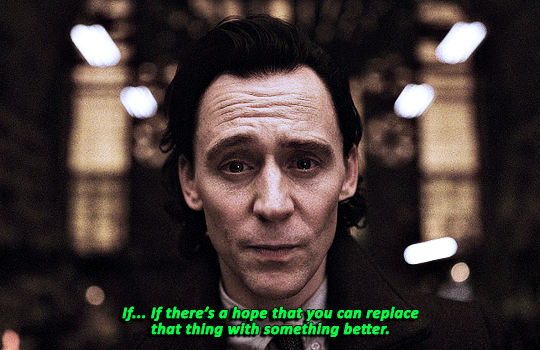
Loki sacrificed himself (selflessness + sparing life [Mobius]) in order to save all timelines (free will + revolution [Sylvie]). Loki sparing Sylvie's life is a direct consequence of Mobius having fought to spare his.
Through this sacrifice, Loki gifts Sylvie the chance to get the type of positive experiences she wants and needs, which includes future romance, if she so chooses. That is canon and is a genuinely romantic gesture regardless of anyone's interpretation of mutual reciprocation or lack thereof.
It is also canon that Loki loves Mobius and Mobius loves Loki. Their actions for one another across both seasons demonstrate this to be true. Is it also romantic? Absolutely. Is it sexual? On screen, no, and it doesn't have to be. Romance does not require sex, let alone physical contact, to exist.
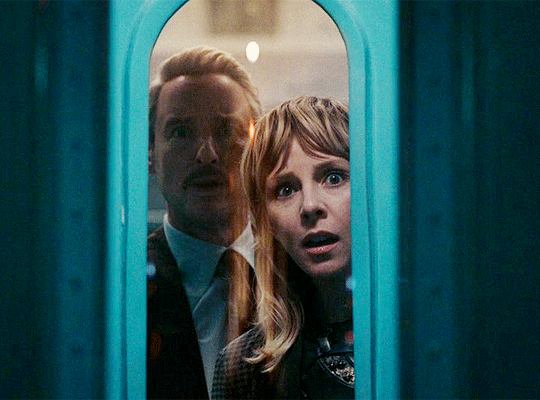
Loki loves them both.
93 notes
·
View notes
Text

Bisexual media
Note: This should not be taken as a declaration of quality or my personal likings - I haven’t fully (or even at all) consumed the media below. Not all of the shows focus on a bi protagonist but all do have at least one bi main character; a summary of main initial plot is provided. I will edit this post with updates intermittently.
TV Series
The Bisexual (2018) - Leila explores her attraction to men after identifying as a lesbian alongside her girlfriend and friends for the past decade, while her new roommate tries to get a grip on his relationship with a younger woman.
Black Mirror’s San Junipero - Yorkie meets Kelly in the strange setting of San Junipero. What’s the deal with this place, and what can make them stay?
Bob and Rose - Bob is gay. Rose has a boyfriend. Can I make it any more obvious? (I can - they find that they’re attracted to each other and deal with the implications and expectations of that.)
Crazy Ex-Girlfriend - Rebecca pursues her ex-boyfriend in the hopes of finding happiness. With a drastic move to West Covina, will she learn what happy feels like?
Cucumber - Henry’s life is upturned in one evening, then another, and then some more, while boyfriend Lance and new acquaintance Freddie come to terms with the present and the past.
Everything Now - Newly out of recovery from anorexia, Y11 student Mia is determined to complete her bucket list and be seen as normal.
Feel Good - Mae and Charlotte navigate a relationship challenged by Mae's drug addiction and Charlotte's new sexual discovery.
High Fidelity - Young record store owner Rob revisits her past relationships in order to sort out her singledom.
Kieta Hatsukoi - Aoki lies about having feelings for classmate Ida to protect the feelings of his crush Hashimoto. But misunderstandings and revelations cause a hullabaloo.
Torchwood - this Doctor Who spin-off features a collection of characters solving alien crimes.
Movies
Appropriate Behaviour - Brooklyn dweller Shirin deals with her ex-girlfriend, family expectations, job struggles and more.
City of Lost Souls - a German musical exploring the experiences of LGBT people, black people, Jewish people and immigrants in post-WW2 Berlin.
Disobedience - Ronit returns to her old Orthodox Jewish community after her father passes away, having been shunned for not adhering to cultural expectations.
Shiva Baby - While at a Jewish funeral service with her family and community, college student Danielle navigates an awkward situation with her sugar daddy and her ex-girlfriend.
Books (Admittedly, I do not read nearly enough so in addition to my own suggestions, I'd like to recommend @the-bi-library!)
Fiction
You Could Be So Pretty (Holly Bourne) - In a world not too unlike our own, where girls and women can be Pretties or Objectionables, what will schoolgirls Belle and Joni make of their lives under the Doctrine after an incident brings them together?
Your Driver Is Waiting (Priya Guns) - Damani, a RideShare driver, falls hard for a white upper-class girl, but she's been grieving her father, caring for her mother and dealing with the ever-growing tension from protesters across the city. When Jolene acts with massive consequences, what will Damani be pushed to do for herself and her community?
Non-fiction
In The Dream House (Carmen Maria Machado) - Machado goes through her volatile relationship with The Woman From The Dreamhouse, intercut with musings on pop culture and history.
Strong Female Character (Fern Brady) - famous in British comedy circles, this autobiography follows Brady's life growing up in Scotland as an autistic woman.
You're Embarrassing Yourself (Desiree Akhavan) - from the Creator of The Bisexual and Appropriate Behaviour, this autobiography covers Akhavan's life as a bisexual Iranian immigrant.
Bisexuality research/history/essays
Bi Any Other Name: Bisexual People Speak Out
Bi: Notes for a Bisexual Revolution
Bi: The Hidden Culture, History and Science of Bisexuality
The Bi-ble Volumes 1 and 2
Claiming the B in LGBT - Illuminating the Bisexual Narrative
Go the Way Your Blood Beats - On Truth, Bisexuality and Desire
A History of Bisexuality
Purple Prose - Bisexuality in Britain
Music (This is for songs which are outright bisexual, not just songs inspired by bi experiences or by bi artists. Also, no Sweater Weather.)
Alicia Champion - Bi
Ana Carolina - Homens e Mulheres
Ani DiFranco- In or Out
Anne Marie - Perfect to Me
Bali Bandits - Girls & Boys
Book Of Love - Pretty Boys and Pretty Girls
Cariño - Bisexual
Christina Aguilera - Not Myself Tonight
Delli Boe - Bisexual Problems, Bisexual Problems 2
Demi Lovato - The Kind Of Lover I Am
Domo Wilson - Becoming Myself, Bi Pride, Bisexual Anthem
Halsey - Alanis' Interlude, Bad At Love
HOUSE OF SAY - Boys Girls
Jão - Meninos e Meninas
Jesse - Girls & Boys
Jessie Paege, Lucy & La Mer - Not a Phase
King Kitty - Bisexual
Megan Thee Stallion - Captain Hook
MIKA - Billy Brown, Blame It On The Girls
Miley Cyrus - Midnight Sky, She's Not Him
Missy Higgins - Scar
Mitski - Cop Car
Peaches - I U She
Peter Allen - Bi-Coastal
Poppy - Girls In Bikinis
Torrey Mercer - Boys / Girls
Ysa Ferrer - To bi or not to bi

118 notes
·
View notes
Text
June 2024 Wrapup!
That’s it, Pride’s over. We’re done with any need to be queer because we obviously defeated the forces of not queer.
Hey how do all those dudes who are convinced they’re straight think their sexuality handles being attracted to nonbinary people? Like, nonbinary people can look like anything, presentation is a performance and everything, but if you believe in inherent qualities of genders, seeing a nonbinary person who’s hot has to be a problem right?
(oh who are we kidding, they pretend nonbinary people don’t exist. But if you do accept nonbinary people exist, you might be less straight than you think.)
Alright, let’s look at what articles came up in the Game Pile this month!
Gay Sauna: The Board Game, where we talked about the acceptable boundaries of genre mechanisms.
Arcade Spirits, where I made a video retelling my experiences of dealing with a game that I shouldn’t call a visual novel, because someone out there will get annoyed at an imperfect cladistic categorisation of game genres
Signalis, a game that oozes style but also told me to stop playing it, so I did
3 Indie TTRPGs, with Feathers, For the Dungeon and We Saved The World Once in a video
If you think the video on Feathers, For The Dungeon and We Saved The World Once was a bit ropy, yep! It got made very quick and close to the deadline because it was very difficult to make. Cooking these games down to entirely positive feedback without talking more about things I find personally interesting was hard enough, which is why the first seven minutes of the video are about problems with how we talk about indie TTRPGs.
Also, a thing I was really delighted by was getting to play Loom with Fox for the first time (part 1, part 2)!
Then there was this month’s Story Pile, about which I was way more enthusiastic!
Nimona, which is a great movie for kids,
Mobile Suit Gundam: The Witch From Mercury, which is a great anime, for slightly older kids!
Magical Revolution of the Reincarnated Princess And The Genius Young Lady, which is a mid anime, for slightly older kids still!
Bound, which is, uh, it’s not for kids
What else happened this month that I’m proud of?
Hm.
Hmmm.
This is a surprising one to say because normally I can think of articles that I want you to read in a sort of ‘well why haven’t you looked at this.’ But I’m in a bad mood right now and it’s colouring things about how I look at my own writing. My article on LIGMA is tainted by knowing how little of the greater context of the area I can communicate. My article about What Disgusts Jod got a response from a Locked Tomb fan that seemed to imply that actually, Jod wasn’t bi or pansexual, because a guy can have a threesome with a man and a woman and people will still try and pretend bisexuality doesn’t exist. My article about Tieflings was probably the thing I’m the most proud of this month, in the idea of the kind of writing I like doing, and I think my article on Faces For Skins is important? At least I avoided another breakdown article about how badly I feel Pride culture connects to or relates to me, though maybe that just shows up in the work in general.
There’s this month’s shirt design:
How hard is the Barbie aesthetic to replicate? With lookalike fonts it’s shockingly easy. I note that this one specifically is a drop shadow and not a 3d semblance, as you can see on the bottoms of the ls. Hey, do you want this on a sticker? Go for it!
In terms of real world events, June is jam packed. It’s the end of the Autumn Semester for me, as a tutor for one. This semester, I took on a lot of marking work, which I like to do, but which also meant that I looked at 118 asignments this month, and 60 of them had a 5 minute audio visual component. That’s five hours of student material to just watch. It ain’t nothing, and it adds up over time.
It’s also a time with four major family birthdays in them, which means I have to find ways and times to attend to physical events. This is not a problem, because I love my family but it sure makes me mindful of just how long it takes me to recover from that to do, y’know, things with myself like write for the blog. Marking periods take time out of the blog work.
The subject matter of the month is also less of a freebie than you might think because I feel like some things are too repetitive – I don’t imagine I’m going to find a third Transformers character to write about next year, for example. There’s also the way that February and June kinda blur together – I’m very fond of talking about queer media in February since that’s one of the most fun kinds of smoochy media I like.
I aim to keep the queued posts for this blog up to 50, so every day if I add a post, it goes to 51 and dips back down to 50. I also try to make sure I’m four weeks ahead on the video channels. This month, as I write this, I am one week ahead on the video, and the queue is down to 45. I am frustrated! But I am doing things to overcome that, and in the coming weeks, I don’t have to grapple with a theme!
I haven’t been getting to bed at good times. This month has featured multiple days where I get to bed at 4 in the morning, one even at 5. This is bad and I hate it. I hate it especially because it takes a long time to recover from it, to get back to sleeping at even the modestly more sensible time of midnight to one AM. I also haven’t been cooking as much as I want to — even modest resistance means that suddenly dinner is some microwaved oats and sultanas, with a splash of milk.
I think I may even be missing one of my June goals for Magic The Gathering: Arena, which isn’t exactly important, but it is a bit of a pisser. The aim was to hit gold tier in limited, which at this point I have… a few hours to do, and I’m still in Silver Tier. That’s not a big deal but it is a bummer.
Check it out on PRESS.exe to see it with images and links!
13 notes
·
View notes
Note
hello! i love your blog! i was wondering, do you have any nonfiction bi book reccs?
Of course! Here are some
💕Anything That Moves: Beyond the Myths of Bisexuality
💕Bi: Notes for a Bisexual Revolution by Shiri Eisner
💕Bisexual Men Exist by Vaneet Mehta
💕Getting Bi: Voices of Bisexuals Around the World
💕RECOGNIZE: The Voices of Bisexual Men
💕The Bisexual Option by Fred Klein
💕Bi Any Other Name: Bisexual People Speak Out
💕Bi: The Hidden Culture, History, and Science of Bisexuality
#Bi non fiction books#Bi books#Bisexual books#Bi rep#Bi representation#Bisexual rep#Bi nonfiction books#Asks#My posts#Lists
58 notes
·
View notes
Text
This is another post which isn't completely ply focused, but I want to take a second to point out the overlap between people who are transmisic and people who exclude/invalidate mspec lesbians.
Last week, I made a post where I mentioned being a polysexual lesbian, and I made a few mspec lesbian pride flags. Yesterday, someone asked if I was polysexual or a lesbian.
On this blog, we have rules for interaction, as well as rules for mods to follow. At the very top, we have a rule against exclusion and invalidation towards good faith identities, and a rule against bigotry and dogwhistles. However, we will answer questions when they may have been asked in good faith.
So, I answered with this:
Both. I'm attracted to many genders, but not binary men, so I find that polysexual and lesbian both describe my orientation well. Other people may identify as a polysexual lesbian for other reasons.
After I answered, the mask came off, and they started being transmisogynistic and nonbinary-exclusionary, and weaponized the existence of bimisia against me. I deleted their comments and blocked them last night, so I can't copy what they said word for word, but I will repeat their key notes under the cut.
CW: bi erasure, exorsexism/nonbinary-erasure, transmisogyny, mentions of genitalia

"This is what people mean when they talk about bi erasure. You're erasing bi people."
This is a complete misunderstanding of what bi erasure even means. Bi erasure is when you ignore (the existence of) bi people, or outright deny their existence. These are some examples of bi erasure:
Erasing or ignoring bi history.
Saying that bi people need to just "pick a side."
Saying that bi people are secretly straight/secretly gay.
Saying that bi is just "a transitional orientation" or "a phase."
Redefining the broad definition of bisexuality without the consent of the bi community, especially with the intent of telling people that they "aren't really bisexual" or replacing the bi label.
Saying that "everyone is a little bit bisexual," especially with the intent of erasing bisexuality as a distinct category. This can also be a form of erasure against people who aren't bisexual.
Note that "identifying as something other than bi" is not a form of bi erasure, even if you might "technically" fit the definition... Because that is a matter of personal identity.
But do you know what is a form of bi erasure? Erasing bi history. Mspec lesbians (particularly bi lesbians), have existed for decades. It is not a new identity, and bi women and enbies have a right to identify their attractions to women as lesbian attraction if they wish to. The exclusion of bi people from the lesbian label began as a form of bi erasure. It happened because of separatism and political lesbianism, and an idea that attraction to men "tainted" people, or was a "betrayal" to feminism. It happened because of bimisia.
The word "lesbian" has served as an umbrella term synonymous to "sapphic" for over half a century. You want sources? Here you go.
Miller, Trish. Lavender Woman, Vol. 2, No. 5. Lavender Woman Magazine, 1973. "What is a lesbian? To me, a lesbian is a woman-oriented woman; bisexuals can be lesbians. A lesbian does not have to be exclusively woman-oriented, she does not have to prove herself in bed, she does not have to hate men, she does not have to be sexually active at all times, she does not have to be a radical feminist."
Ferguson, Ann. Patriarchy, Sexual Identity, and the Sexual Revolution. Signs: Journal of Women in Culture and Society, 1981. "Lesbian is a woman who has sexual and erotic-emotional ties primarily with women or who sees herself as centrally involved with a community of self-identified lesbians whose sexual and erotic-emotional ties are primarily with women; and who is herself a self-identified lesbian."....."[My definition] defines both bisexual and celibate women as lesbians as long as they identify themselves as such and have their primary emotional identification with a community of self-defined lesbians."
Kafele, Dajenya Shoshanna (1991). Bisexual Lesbian. Archived from the original on July 25, 2022.
Queen, Carol A.. Strangers at Home: Bisexuals in the queer movement,. 1992. "A great many bisexual women, particularly those who are feminist and lesbian-identified, have felt both personally and politically rejected and judged by the separatist sisters."
Kafele, Dajenya Shoshanna. "Which Part of Me Deserves to Be Free?". Bisexual Politics: Theories, Queries, & Visions. New York : Haworth Press, 1995. ISBN 9781560249504. "Personally, I am unable to separate out the various ways that I am oppressed (as a woman, as an African American, as a bisexual lesbian, as an impoverished single mother) and say that one oppression is worse than the other, or that I desire one form of liberation more than another."
Wyeth, Amy. "Don't Assume Anything". Bi Women: The Newsletter of the Boston Bisexual Women's Network. Vol. 5, No. 2, 1995. "Unfortunately, many of my experiences as a lesbian-identified bisexual woman have said to me that having an appearance or demeanor that diverges from the expected means I will not be accepted as truly belonging in the lesbian community. Despite my attendance at gay pride parades, dollars spent at gay resorts and in support of gay causes, and numerous attempts to participate in gay and/or lesbian groups and volunteer events, I have often felt unaccepted by this community."
Holleb, Morgan Lev Edward. The A-Z of Gender and Sexuality. Jessica Kingsley Publishers, 2019. ISBN 9781784506636. "LESBIAN — A woman who is sexually or romantically attracted to women. Lesbian can mean women who are attracted exclusively to other women, but it is also a broader term for women and femmes who are attracted to other women and femmes. This includes bisexual and pansexual women, asexual women who are romantically attracted to women, and non-binary people who identify with womanhood."
Lesbian. The Trans Language Primer. Archived from the original on October 22, 2021.
Does this mean bi people have to identify as lesbians, or "aren't actually" bi, or can't just identify as bi? Obviously not, and I never said that was the case. That would be bi erasure, because that's policing bi people's identities and forcing them under labels that they may not want to be included under. But in the circumstance that a bi person also identifies as a lesbian, they have every right to do so. Bi-inclusive definitions of lesbianism have existed for at least 51 years, and still exist today.

"Attraction to men, binary or not, means you're not a lesbian."
See above for why the lesbian identity is not always dependent on a lack of attraction to men, binary or not. But lets focus on the nonbinary part specifically:
Nonbinary people can people included in lesbianism and lesbian attraction if they want to be. Yes, that includes all nonbinary genders. Even if attraction to men inherently disqualified a person from lesbianism, nonbinary genders cannot be confined to binary gender rules (even when they're aligned with binary genders) because they're nonbinary. Treating nonbinary genders like they're "functionally the same as binary genders" is a form of nonbinary erasure, regardless of gender alignment.
Whether nonbinary people are included in lesbianism or not is entirely up to each individual nonbinary person regarding their own identity. It is not dependent on the gender label used; it is dependent on how each nonbinary person feels about it on an individual level.
The implication that manhood inherently dominates and erases the rest of a person's identity is also troubling. If you accept that nonbinary people can be included in lesbianism, you must also accept that nonbinary men can be included in lesbianism. A nonbinary man is still nonbinary; their manhood doesn't erase that.
As a pangender lesbian, I've had to deal with the experience of people not only erasing my enbyhood, but my womanhood as well, because they think my manhood is the only relevant aspect of my identity. This is misogynistic and exorsexist, plain and simple, and people use this misogyny/exorsexism to tell me that I'm not a lesbian.
With all of that said, nonbinary people (of any gender alignment) are not always comfortable being included in lesbianism. This is why I describe myself as both polysexual and a lesbian; the polysexual part of my orientation acknowledges that my attraction to enbies can't always be described with my more binary-aligned labels.
And funnily enough, while some people tell me that I can't be a lesbian and can only be polysexual, other people tell me the opposite. So clearly, there isn't a consensus on which label is "correct" for me.

"If it has a dick, you can't be a lesbian."
This is just blatant mask off transmisogyny, and it's the main reason I blocked them. Do I even need to explain what's wrong with this? Even under a strictly monosexual definition of lesbianism, this statement is just false. Being attracted to people with penises does not equal being attracted to men. If a lesbian is exclusively attracted to women, including women with penises, that lesbian is attracted to only one gender and is not bisexual or mspec.
Any gender can have a dick. Lesbians can have dicks. Women can have dicks. The presence of a penis or lack thereof is not a defining trait of lesbianism, nor monosexuality. And for fuck's sake, maybe don't call your hypothetical trans woman "it"??
"Mspec lesbian" does not mean "lesbian who is attracted to vaginas and penises," and if you think that's what it means, you need to educate yourself. Yes, this includes any people who might identify as an mspec lesbian because of that transmisogynistic definition.

This blog is an inclusive space. If you come in here to spew bigoted or exclusionary nonsense, expect to be blocked. Think before you speak, and please read our rules.
#Mod Kylo#not ply centric#polysexual#polyromantic#ply#ply lesbian#mspec lesbian#bi lesbian#pan lesbian#omni lesbian#lunian#bi history#transmisogyny#transmisogyny tw#exorsexism#exorsexism tw#bi erasure#bi erasure tw#transmisia#transmisia tw#transphobia#transphobia tw#enbyphobia#enbyphobia tw#enbymisia#enbymisia tw#monosexism#monosexism tw#text post#gif
13 notes
·
View notes
Text
I’m starting Bi: Notes for a Bisexual Revolution, and I’m really excited to dig into it! I’ve heard mixed things about it, but I remember seeing the author pop up a bunch back when I was on Twitter, and I love the idea of thinking about bisexuality in radical politics and queer theory, so I’m giving it a try!
2 notes
·
View notes
Note
Hello, I am looking for non fiction bi/bisexual books, could you please help me with that?
Sure, try these:
Bi: Notes for a Bisexual Revolution by Shiri Eisner
Bisexual Men Exist by Vaneet Mehta (out January 19th)
Bi: The Hidden Culture, History, and Science of Bisexuality by Dr. Julia Shaw
51 notes
·
View notes
Text
“From the moment that bisexuality became a category, it also became adoptable as a personal identity, a mark for a type of person rather than a series of isolated acts. What remained, then, for the bisexual movement, was to reclaim bisexuality - as a term, an identity, and a concept - back into the hands of bisexual people, in a way that would benefit bisexual populations and give something back to them.”
- Shiri Eisner, Bi: Notes for a bisexual revolution
3 notes
·
View notes
Text
"The idea that bisexuals are indiscriminate about their choice of partners also echoes society’s anxiety about subversion of cissexist norms. It is often said that “a bisexual is the kind of person who can reach down someone’s pants and be happy with whatever they find.” This emphasizes the fact that we can never actually know what’s “down” anyone’s “pants.” This marks bisexuals as “accomplices” to transgender and genderqueer people, and it connects bisexuality and transgender as two intertwining ideas, both of which deviate society’s rules about normative gender and its enforcement."
Shiri Eisner, Bi : Notes for a Bisexual Revolution (2013)
#shiri eisner#bi: notes for a bisexual revolution#bisexual#bisexuality#trans tag#transgender#genderqueer#nonbinary#lgbt+#bi/trans solidarity#queer literature#bigender-bisexual#all things gender
5 notes
·
View notes
Note
What other turn characters have you thought of writing? Do you think you could write a character like Simcoe, Caleb, Townsend, etc?
Full list of my canon/semi canon, American revolution/TURN muses is as follows, see original character list for that specifically. In that list it’s by historical era.
— Benjamin Tallmadge, Elizabeth Schuyler-Hamilton, Angelica Schuyler-Church, Mary Floyd Tallmadge, Sarah Livingston, Nathan Hale, Abigail (Strong), Lola (LeRoy), Anna Strong, Mary Woodhull, Esther de Berdt Reed, Philomena Cheer, John André & William Wilberforce.
I’ve thought of writing Simcoe, I just can’t write characters who operate in that frame of mind well. By which I mean, TURN! Simcoe is cartoonishly evil (affectionate). I think @johngravessimcoe and @honorhearted do excellent at their portrayals and nuancing their on the surface, very “good” vs “bad” characters. Cause the truth is, the American war of independence was a political war of colonial power vs colonial power as much as a philosophical and ideas war of information and neither side was innocent in it. If I wrote Simcoe it’d be closer to historical RPF, as opposed to his TURN! adaptation. Note that actual Simcoe was a badass and a super reformed abolitionist basically his entire life, just like his peer, the philanthropist and redcoat, William Wilberforce.
I won’t lie, I’ve mostly considered writing chaotic bi disaster Alexander Hamilton, not cause he’s my favourite founding father/founding father adjacent. But because his chaotic, dandy energy is unmatched and also because there’s a mountain of evidence to suggest, strongly, bisexuality. Even by 18th century standards when that was in fashion, ala, the Duchess of Devonshire’s household and her affairs across the gender spectrum.
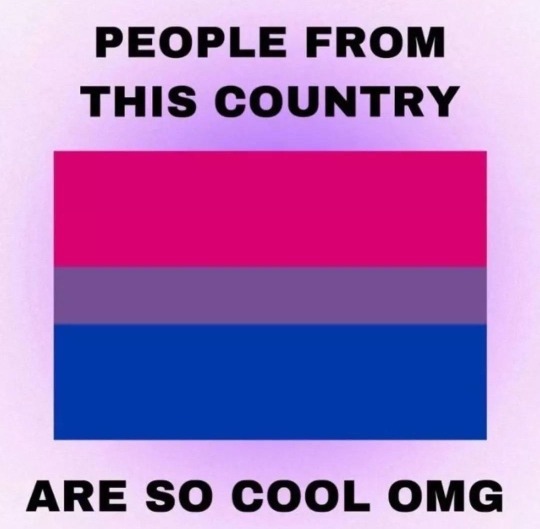
For an excellent Caleb Brewster, I must direct you to: @firstmategod. for Bradford: @curseconsumed, and for Abraham Woodhull & Edmund Hewlett: @sharp-teeth-and-wide-grins / @cabbxges-and-kings, for Alexander Hamilton: @fromnevis & @adcthamilton & for Washington: @historiavn 💕

2 notes
·
View notes
Text
@eiriee replied to your post “@butyouvealwaysbeenthecaretaker replied to your post “I hate to say it, but...”
Do you have any posts on your thoughts regarding Bi: Notes? It's been on my shelf for years & I've read some of it but not finished.
I do, but they’re older and mostly rambling. The trouble I have with the book is that there’s so much content and framing that I disagree with that it’s hard to hold it all in my head and draw out a structured criticism for it. It’s been quite a while since I looked through it, but here are a couple of things I discussed in my older posts.
So, you know how some people will say that hostility toward women-loving women or woman-woman couples that’s expressed in the language of “lesbians” or “dykes” isn’t really about bi women? Eisner pulls a similar move to put bi women and biphobia at the center of harassment against WLW. They have a section on Sexual Violence in Chapter Four where they talk about men pressuring bi women (and also lesbians) to engage in threesomes or “perform bisexuality” by making out with other women. They then say (bolding mine):
At this point, some of you might be wondering why I consider these types of violence against bisexual women [men harassing women who make out in public, men asking if “they can watch,” etc] as biphobic rather than lesbophobic, since lesbians are often harassed in very similar ways to the ones I described. This is biphobia, however, rather than lesbophobia because this type of harassment is based on biphobic beliefs and perceptions even when they are aimed against lesbians. As explained throughout this chapter, the logic of this type of sexual violence is that bisexual women are “actually straight,” or only performing their bisexuality for male pleasure. When lesbians are harassed in the same way, they are first presumed to be bisexual, and then attached with the same biphobic notions used against bi women. What happens here is a combination of lesbophobia and biphobia: Lesbians first have their lesbian identity erased, and then are presumed to be “actually straight” as a result of being presumed as bisexual. Thus, biphobia constitutes the center here, and remains biphobia even when it is aimed at lesbians.
What we can see here is that this type of biphobia not only harms bisexual women, but also monosexual women, as it is also aimed against them. As explained above, lesbians often receive the same type of harassment as bisexual women when being affectionate or sexual in public. Heterosexual women are often also subject to pressure by strait men to perform bisexuality (privately or publicly) for their pleasure. In many communities (especially ones that consider themselves "alternative," "open," or "liberal"), performative bisexuality might be a standard that all women must meet. This means that in those communities, women are expected and pressured into being sexual with other women for the satisfaction of straight men. Although this mostly harms bisexual women (who are presumed to want this simply because they identify as bisexual), it also works against monosexual women.
What all of this means is that biphobia against women is not only the concern of bisexual women, but of all women regardless of their sexuality identity. [...]
This differs from the “misdirected lesbophobia” discourse, because they’re arguing that all women can be negatively affected by biphobia, and present this as a reason that people should take biphobia seriously. The people who argue that expressions of lesbophobia toward bi women are just “misdirected” are more often emphasizing a disconnect between the effect it has on bi women versus lesbians, and want to see this hostility as “really” only about lesbians (so that “dyke” as a politicized identity is the cultural property of lesbians exclusively). So Eisner’s not being as stingy with the centrality they claim for bisexual subjects in this type of harassment, but it’s still a shit move and denies a lot of ground to what can be considered “about” lesbians.
Ironically, I think Eisner and the “misdirected lesbophobia” camp talk about lesbophobia in a similar way, where the subject of “lesbophobia” must be understood--even by homophobes--as a woman who is exclusively attracted to women. The “misdirected lesbophobia” camp say that “a woman who is exclusively attracted to women” is what’s really on the homophobe’s mind when he calls a woman “dyke,” and therefore the insult can’t be about bi women, while Eisner presumes that a man harassing a woman to perform for him must believe that she’s genuinely open to men and therefore cannot really see her as a lesbian.
I think both sides misunderstand the slippages that occur when people see expressions of woman-women eroticism. I would argue that homophobia against women (which I would just call lesbophobia) often involves a denial that woman-woman eroticism is real/final, and that any women should be permitted to have sexual relations and identifications outside of particular heterosexualities. In other words, it’s possible for someone to know that there are women in the world who call themselves “lesbians” and claim to only like women, and to believe that this phenomenon is bad, without believing that “women who only like women” actually exist. If such a person argues that “lesbians” are just women who can’t get a man (an argument which presumes they want men), this is still a message about what self-identified “lesbians” are like, even though it totally dismisses their own understanding of their lesbianism. But going further, this message isn’t just “about” self-identified lesbians either, because it’s implicitly a message about all woman-woman eroticism and identifications, including bi women’s identity and desire toward women. Arguably, it’s even about women more broadly, in that it suggests that getting a man is a central preoccupation for women, and that perceived rebellious from women can be dismissed as a petulant reaction to failure in this area, rather than a reflection of agency and goals beyond patriarchal expectations.
In any case, it’s inaccurate to claim that this kind of harassment can’t really be “about” lesbians. Eisner’s logic isn’t consistent here, as you’ll notice. If a lesbian is treated as though she were open to men, they reason that actions toward her are reflective of attitudes about bi women specifically, not lesbians. But when a bi woman is treated as though she were “actually straight,” they don’t conclude that actions toward her must reflect attitudes toward straight women, not bi women or lesbians. There also isn’t an option for lesbians to be directly perceived as “actually straight,” even though this isn’t uncommon. Any suggestion that a lesbian might be open to men automatically moves the topic to bi women, meaning that there’s a whole huge area of lesbophobia that fundamentally has nothing to do with lesbians. (I think this move is cruel and outrageous, even if it’s a reversal of a move often used against bi women.) I also think they make the mistake of presuming that men only pressure women whom they think will be open to their advances. While the idea that women might eventually “like it” can be used as rationalization for this behavior, I think the behavior is rooted more in a simple lack of concern for women’s interests and boundaries, when men expect that they can get away with ignoring these.
Eisner makes similar moves in other places. Here they are talking about “lesbian” porn:
Following all of this, I think it would be more accurate to discuss “lesbian” porn in terms of bisexuality. If we follow from the sexual acts performed by the women appearing in these types of scenes, it would be very hard not to notice that bisexuality is here at work. The women in scenes titled lesbian have sex with each other, as well as with men. Even in scenes where no man is present at all, the logic behind the activity is still bisexual, since the women are perceived to be performing for a cis straight male audience.
These representations of bisexuality, in turn, contribute to the cultural construction of female bisexuality as we've seen it in the media depictions above. The media take up on the pornographic logic of bisexuality and send the same messages, but in covert ways. Thus, looking into pornographic representations of bisexual women might help us shed light on social and cultural treatment of female bisexuality in general.
Instead of recognizing the possibility for slippages in meaning, or that there can be inaccurate messages about lesbians as well as bi women (e.g. lesbian sexuality can also be regarded as a performance for men), Eisner finds in these representations an essential and exclusive bisexuality. Now, I do think that media representations of “lesbians” also inform attitudes toward bi women, that looking at them can be useful, and that representations of “lesbians” can simultaneously be representations of bisexuality. But I think it’s a silly exercise to claim that “lesbian” porn is only depicting bisexuality, as if the (fictionalized) dynamics depicted in media have their own independent and singular reality which can be empirically determined. Just a couple paragraphs above this, they obverse that “[t]he women's sexuality is irrelevant since the definitions are not about them but about the men fucking or watching them.” They should have gone a little bit farther with this idea, in my opinion!
While there are times when it makes sense, I think there can also be a danger in treating bisexuality as a singular expression, encompassing same-gender and man-woman relations, when these relations have very different positions in society. I think Eisner tends to treat bisexuality as a singular, marginalized expression that needs protection, including from gay people, in a way that can end up aligning with heterosexism. I don’t remember if this idea featured in their book, but they once made a post saying:
All gay and lesbian readings of mainstream movies and TV are based in bisexual erasure. Because in order to read characters as gay or lesbian, it is necessary to erase the character’s different-gender attraction and relationships.
It’s telling that they’re talking about “characters” having different-gender attraction, because of course these sexually-unmarked, mainstream “characters” are actually imagined, depicted, and normally received as straight. Eisner is again employing some weird media analysis where characters, even across individual imaginings (i.e. from the original creator’s depiction to a fan depiction), seem to have an independent reality. So interest in man-woman relations is an essential part of the character, always. Then, when you want to imagine that the character is interested is same-gender relations, you can only add that as an additional fact, thus making the character bisexual. And then, by becoming part of a (hypothetical) singular bisexual expression which is uniformly marginalized, canon man-woman relations now need protection against gay readings that would “erase” them. Even though these are actually straight characters in heteronormative media. The end result is that we’re meant to always uphold man-women relations as integral to a character’s (or anyone’s?) sexuality and identity.
In general, my impression when reading the book was that Eisner solely wants to look at identity or group belonging as the site of oppression, and doesn’t want to give any attention to the ways that man-woman relations themselves may be relatively valued, legitimized, and enforced over same-gender relations. I can understand the reluctance to look at those processes, since bi people’s potential engagement in man-woman arrangements is often used to deny their sexualities and the possibility that they could face any problems, or even an intensification of problems in some areas over lesbians or gay men. But these processes are still an important part of patriarchal gender systems, and need to be part of the analysis. I don’t have a good quote for it, but this one might suggest a bit of that line of thought:
The idea of passing as an act of disguise presumes an essence of identity. Without a "true core," a disguise becomes impossible, for the very meaning of disguise comes from the discrepancy between what one "is" and what one is "seen" and "understood" to be. However, instead of being an essentialist notion, passing can subvert these presumptions by showing, in practice, that appearances--including one's very body--are no guarantee for the "truth" of one's identity. From this point of view, passing becomes particularly useful in demonstrating the way in which all identities and appearances are socially constructed, the way identities are written into our very bodies, and the enormous fragility of these constructs themselves.
In the case of bisexuality, we might look at society's insistent attempts to naturalize both homosexuality and heterosexuality, appealing to bodies, genes, hormones, and brains in order to establish that "this" (the sexuality in question) is inborn, natural, and immutable. Under this logic, one is either "born" gay or "born" straight, and thus any performance of their desires is "true to its nature." Being in a same-gender relationship presumes homosexuality, and being in a different-gender relationship presumes heterosexuality, because one's relationship choices are understood to reflect one's inner essence. Bisexuality— and bisexual passing—short-circuits this circular logic by showing that “acting gay” or “acting straight” does not necessarily equate with “being gay” or “being straight.” It allows us to distrust visual presentations and to deconstruct claims of inner essences. In this way, bisexuality may again be one way out of rigid identity constructs, a way of resisting both the lines of separation imposed by them and the hierarchies built upon them.
That’s nice, but you actually don’t need to imagine that same-gender acts stem from a different innate character in order to condemn them, or to institutionalize heterosexuality to the detriment of other pursuits. You don’t need naturalized concepts of essential heterosexuality and homosexuality in order to have a “hierarchy” among social arrangements and practices. In fact, ambiguity between subjects and the inability to finally “prove” that a person is one way or another can actually be beneficial to oppressive systems. When there’s ambiguity, more people can come under scrutiny and face demands to continuously prove themselves by conforming to gendered expectations or distancing themselves from marginalized subjects and practices.
That goes back to my original complaint that bi theorists focus too much on minority sexual discourses. Man-woman sexual relations and kinship can be institutionalized (while same-gender ones are stigmatized or denied) without any reference to “heterosexuality” as one of multiple sexual orientations. It does NOT need a corresponding “homosexuality.” The “gay-straight binary” is not a crucial linchpin within systems of gender. These discourses on sexual orientation do exist and do have more institutionalized backing now, so that more people are now forced to engage with them at some points. But I still don’t see them as really universal or fundamental to gender/patriarchy overall. I think the exclusive focus on discourses of “sexual orientation” leads to distorted analysis, because there’s just more going on in society.
There were just so many things they said that I objected to, and I really just don’t agree with their whole approach.
Although, I was originally complaining about another paper I was reading, which seems to be a Master’s thesis (although that’s hard to believe, because it’s so bad). It’s “The Bisexual To Be Corrected: Interrogating The Threat And Recuperation Of Women's Femme Bisexuality,” which can be found here. This was one part that I thought was especially... lackluster:
As several women I interviewed point out, heteropatriarchy needs people to be monosexual, or attracted to only one gender, in order to neatly hierarchize. It is rather difficult to maintain the disenfranchisement of a group if that group is incoherent, with its members presenting in different ways that shift, slip, and take on a variety of meanings. The notion that women can be attracted to men, women, and other genders simultaneously is a threat, because it points to the fact that perhaps masculinity and femininity, men and women, are not such polar opposites at all... and if men are not the powerful, aggressive, dominant opposites of women, why should they be at the top of the hierarchy? If masculinity is not the opposite of femininity, then perhaps all men are more intimately related to femininity than they would like to think. This line of thought destabilizes the patriarchal order, so monosexism and biphobia punish bisexuals for their attraction to multiple genders—and more specifically, for destabilizing the gender binary. Bisexuality must be erased, invisible, and invalid because it threatens core values of patriarchy that organize and define our culture. [...]
Again, this relies heavily on the idea that clarity between groups is necessary for hierarchy, and that ambiguity is automatically destabilizing rather than beneficial. (Like, not only does ambiguity extend the circulation of the power-effects of these discourses among more subjects, as Storr would say, but it also provides a measure of flexibility to the system: if you can’t condemn and/or recuperate something using one approach, you can try a contradictory approach.) Even beyond that, the idea that you need “facts” and “consistency” in your oppressive ideology is obviously baseless. The author’s understanding of heteropatriarchy is again focused only on categories of people, even though behavior itself can be regulated (and categorized), and everybody’s behavior is subject to regulation within systems of gender. While I think that gender dualism is very relevant to how bisexuality is understood, my thinking is more that bisexuality won’t be a non-issue until gender dualism is undermined, and less that the very existence of bisexuals inevitably results in the undermining of gender dualism. This paper also seems guided by the goal of uncovering intrinsic and maybe unilateral subversiveness in certain groups of people, and I’ve grown kinda w(e)ary of that.
25 notes
·
View notes
Text
Bi: Notes for a Bisexual Revolution by Shiri Eisner
❝Bisexual people themselves served as research objects, the ground upon which to base theories about bisexuality and, indeed, about the entire continuum of bodies, gender, and desire. This means that bisexual people served as the “raw material” for theories that they could not control. Researchers gained their prestigious reputations and symbolic capital on the backs of bisexual research subjects, their lives and experiences, while distributing none of their gains—symbolic or material—back to the community.❞
❝Bisexuality isn’t only a form of desire but also a carrier of multiple meanings (a concept that I will go deeper into later). Bisexuality can be defined and politicized on all or any of three axes that I will describe: desire, community, and politics.❞
❝we may not fuck anything that moves, but, in our rainbow of difference, we practically are everything that moves, and if we welcome each other in these differences as well as in our similarities, we will weave community of strong cloth indeed.❞
❝In fact, inclusion, alliance, and intersections with transgender people and issues have been among the most central topics in the bisexual movement and research even to this day.
The bisexual movement has also been one of the most race-aware movements that I know of. It is often aware of the importance of inclusion of racialized people in the movement, and takes measures to create a more welcoming space for racialized bisexuals. Similar to the inclusion of trans people described above, most bisexual anthologies also contain many essays by racialized people and advocate race awareness within the movement and in general.
The bisexual movement has been one of the most inclusive toward disabled and chronically ill people, setting a unique standard for accessibility to conventions and events. This has been so unique that people from other communities often attend simply to learn more about accessibility, disability, and neurodiversity (as is the case, for example, with the U.K. BiCons).❞
❝They imagine bisexual people—and bisexuality itself—as inauthentic, unstable, predatory, infectious, and dangerous. Implicitly, these stereotypes also entail a demand for normalcy because they present bisexuality as a deviation from the norm, and therefore inherently perverse.❞
❝Bisexuality can be thought of as a destabilizing agent of social change, promoting doubt in anything, starting with our own sexual identities, going through the structure of sex, gender, and sexuality; heteropatriarchy, and racism; and ending with such oppressive structures as the state, law, order, war, and capitalism.❞
❝Monogamy has been used historically and currently as a capitalist and patriarchal tool for controlling women, and for keeping all people in small, docile units where they are isolated and unable to connect and organize (especially in minority-world cultures). This keeps resistance to a bare minimum. In a society based on sexual fear and a culture of rape, the sexualization of bisexuality can open a window to a different kind of sexual culture, encouraging sexual independence, exploration, and enjoyment of our bodies, our sexualities, our various genders, and our sexual interactions. It can subvert and transgress boundaries of identity, body, sexuality, and gender. It can give us a vantage point of opposing patriarchy and heterosexism,❞
❝[Bisexuality] can allow us to look into the ways in which sexuality is imposed on us, without consent and to the satisfaction of others. It can allow us to examine—and oppose—rape culture, sexual harassment, and asexuality-phobia, pointing out the ways that sexuality is imposed on all of us.❞
❝The idea that bisexuals are indiscriminate about their choice of partners also echoes society’s anxiety about subversion of cissexist norms. It is often said that “a bisexual is the kind of person who can reach down someone’s pants and be happy with whatever they find.” This emphasizes the fact that we can never actually know what’s “down” anyone’s “pants.” This marks bisexuals as “accomplices” to transgender and genderqueer people, and it connects bisexuality and transgender as two intertwining ideas, both of which deviate society’s rules about normative gender and its enforcement.❞
❝We can think about bisexuality as betrayal of the trust imposed on us by power structures, as well as embodying an attempt to overthrow or “kill” hegemonic order. We can then use this as a gateway to betraying monogamy, patriarchy, governments, countries, and wars, betraying the “LGBT” (meaning, the GGGG) movement, for promoting the assimilation of our communities and cooperating with oppressive structures. We can be traitors to anything that confines us, and to anything that stands in our way: all power structures, all oppression.❞
❝ • the bisexual movement started gaining momentum at around the same period as the transgender movement. In its early stages, no language was available for the description of attraction to nonbinary sexes and genders. However, throughout the history of the movement, the word has constantly been used for describing it, using such terms as third gender(s), androgynous people, those in between, etc.
• historically, bisexual communities have always been some of the most accepting places toward transgender and genderqueer people, and the two communities have always shared a strong alliance.❞
❝bisexuality is no longer critiqued simply as a term, but is rather experiencing a slippage of meaning: from a problem with words, it becomes a problem with people. If: bisexuality equals transphobia, then: bisexual equals transphobic as well.❞
❝From here until the 1990s, bisexuality and bisexual people fade away from historical attention, despite the fact that gay and lesbian people are mentioned in abundance (both favorably and unfavorably). Just to stress my point, bisexuals were erased in the book even from where they were undoubtedly present: demonstrations, the Stonewall rebellion, pride marches, the gay liberation movement, etc.❞
❝As an academic gay white cisgender man and an academic straight cisgender woman, both theorists had a political and academic interest in eliminating bisexuality from their theory and studies.
[…]
They also assume that by refusing to relinquish our “attachment” to male-identified people, we are perpetuating heterosexual and sexist hegemony and oppression of women and queers.❞
❝The allegations of binarism have little to do with bisexuality’s actual attributes or bisexual people’s behavior in real life. Instead, these allegations stand in keeping with dominant power structures within the GGGG movement, imagining bisexuality as inherently oppressive. It is a political method to keep the bisexual movement clear of the power centers and to keep the bisexual and the transgender movements separated.❞
4 notes
·
View notes
Text
i’m getting books about bisexuality in the mail today and i’m so excited that i’m literally shaking
#tbh it might be the coffee#but i'm VERY excited#the books are bi: notes for a bisexual revolution bi shiri eisner and bi america by william burleson#i ordered the books used from thriftbooks so i could avoid amazon and save money/paper#i hope the books aren't terfy#i usually read books about judaism/jewish history or other social science stuff#i haven't really gotten into queer theory or related fields so im excited#next on the list is gender trouble by judith butler and sincerely your autistic child which doesn't come out until march#im saving up to buy sincerely your autistic child from barnes and noble bc my school has reward points that i can use to get b&n gift cards#the demon speaks#personal
2 notes
·
View notes
Text

(awesome art by @liberaljane ✨)
today’s pride recommendations are:
fiction: aristotle and dante discover the secrets of the universe by benjamin alire saenz

“a lyrical novel about family and friendship from critically acclaimed author benjamin alire sáenz.
aristotle is an angry teen with a brother in prison. dante is a know-it-all who has an unusual way of looking at the world. when the two meet at the swimming pool, they seem to have nothing in common. but as the loners start spending time together, they discover that they share a special friendship--the kind that changes lives and lasts a lifetime. and it is through this friendship that ari and dante will learn the most important truths about themselves and the kind of people they want to be.” - description taken from goodreads
non-fiction: bi: notes for a bisexual revolution by shiri eisner

“this book is essential reading for any bisexual person and anyone who wants to understand the bi people in their life. bi takes a comprehensive look at bisexual politics, from biphobia and monosexism to feminism and trans issues. eisner tackles topics like bisexual stereotypes, accusations that bisexuality “reinforces the gender binary” and otherwise contributes to the dominant social order, myths about bisexuality (like it doesn’t exist or that everyone is really bi), the fact that bi men are deemed gay and bi women are deemed straight, the issue of bi people being accused of having heterosexual privilege and more! reading ‘bi’ changed my life as a bi person.” - description taken from autostraddle.com
send in your art and book recommendations if you wanna see them on one of our daily posts!
#pride month#pride#lgbtqia+#lgbtq+#lgbtq#lgbt#books#fiction#literature#prose#reading#non fiction#aristotle and dante discover the universe#benjamin alire saenz#bi: notes for a bisexual revolution#shiri eisner
11 notes
·
View notes